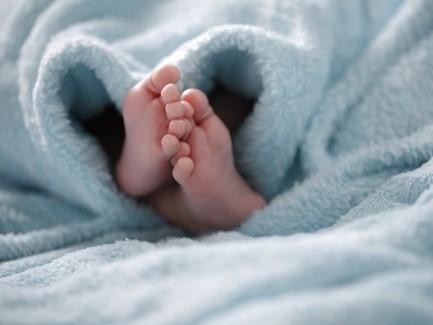Hörtest für Neugeborene
Begutachtet von Dr. Colin Tidy, MRCGPZuletzt aktualisiert von Dr. Hayley Willacy, FRCGP Zuletzt aktualisiert am 10 Februar 2025
Erfüllt die Anforderungen des Patienten redaktionelle Richtlinien
- HerunterladenHerunterladen
- Teilen Sie
- Sprache
- Diskussion
In dieser Serie:Neugeborenen-Screening-TestKörperliche Untersuchungen von NeugeborenenBlutfleckentest für NeugeboreneEntwicklungsdysplasie der HüfteNicht herabgestiegene HodenBehandlung von Gesundheitsproblemen bei Neugeborenen
Ihrem Baby wird in den ersten Wochen nach der Geburt ein Hörtest angeboten. Das ist das Neugeborenen-Hörscreening. Es ist ein sehr schneller Test und verursacht dem Baby keine Schmerzen.
In diesem Artikel:
Lesen Sie unten weiter
Wann wird bei Neugeborenen ein Hörtest durchgeführt?
Eine Krankenhausuntersuchung wird in der Regel durchgeführt, bevor Sie und Ihr Baby das Krankenhaus nach der Entbindung verlassen.
Sollte dies nicht der Fall sein, kann eine Untersuchung zu Hause oder in einer Spezialklinik vereinbart werden.
Das National Institute for Health and Care Excellence (NICE) hat einen Leitfaden für die postnatale Versorgung herausgegeben, der auch Hörtests für Neugeborene umfasst.
Sie empfehlen, dass der Hörtest für Ihr Baby möglichst in den ersten 4-5 Wochen nach der Geburt durchgeführt werden sollte. Sollte dies nicht möglich sein, kann er auch durchgeführt werden, bevor Ihr Baby 3 Monate alt ist.
Schwerhörigkeit bei Babys ist ungewöhnlich und betrifft nur etwa ein bis zwei Babys von tausend. Es ist jedoch wichtig, diese Tests durchführen zu lassen, damit Ihr Baby bei Verdacht auf ein Hörproblem an einen Spezialisten überwiesen werden kann. Wenn Sie ein Hörproblem bei Ihrem Baby vermuten (z. B. wenn es nicht auf Ihre Stimme reagiert oder bei lauten Geräuschen erschrickt), können Sie dies mit Ihrem Arzt oder Gesundheitsberater besprechen.
Wie wird das Gehör überprüft?
Der am häufigsten durchgeführte Test ist der Screening-Test der Automatisierten Otoakustischen Emission (AOAE). Er wird sehr häufig etwa am ersten Tag nach der Geburt durchgeführt. Bei diesem Test führt ein Techniker eine sehr weiche Sonde in die Ohren Ihres Babys ein, die an ein Gerät angeschlossen ist. Damit lässt sich feststellen, wie gut Ihr Baby hört.
Der Test dauert nur ein paar Minuten und sollte für Ihr Baby nicht belastend sein. Das Ergebnis erhalten Sie unmittelbar danach.
Wenn dieser Test nicht normal ist, bedeutet das nicht unbedingt, dass Ihr Baby nicht hören kann. Der Test könnte abnormal gewesen sein, oder die Antworten könnten aufgrund von Hintergrundgeräuschen oder weil Ihr Baby unruhig war, nicht klar gewesen sein.
Wenn Ihr Baby mehr als 48 Stunden auf einer Neugeborenen-Intensivstation (NICU) oder einer Spezialstation für Säuglinge (SCBU) verbracht hat, können ihm zwei verschiedene Hörtests angeboten werden - AOAE und AABR (Automated Auditory Brainstem Response) (siehe unten).
Lesen Sie unten weiter
Was ist, wenn ein Neugeborenes den Hörtest nicht bestanden hat?
Wenn die Ergebnisse des Hörscreenings Ihres Babys nicht eindeutig sind (auf einem oder beiden Ohren), erhält es einen Termin in einer spezialisierten Hörklinik in einer audiologischen Abteilung.
Wenn der erste Test nicht normal ist, wird Ihrem Baby möglicherweise ein Wiederholungstest angeboten.
Alternativ dazu kann ihnen zu einem späteren Zeitpunkt ein speziellerer Test angeboten werden, nämlich der AABR-Test (Automated Auditory Brainstem Response). Bei diesem Test werden drei kleine Sensoren zusammen mit Kopfhörern auf den Kopf Ihres Babys gesetzt. Die Kopfhörer werden über die Ohren Ihres Babys gestülpt. Das Gerät misst, wie gut die Töne über die Hörnervenbahnen Ihres Babys vom Ohr zum Hirnstamm gelangen. Dieser Test dauert zwischen 5 und 15 Minuten.
Was ist, wenn die Testergebnisse nicht normal sind?
Wenn die Ergebnisse des Hörscreenings Ihres Babys nicht eindeutig sind (auf einem oder beiden Ohren), erhält es einen Termin in einer spezialisierten Hörklinik. Dieser Termin dauert in der Regel 1-2 Stunden. Versuchen Sie, Ihr Baby vor dem Termin zu füttern und bringen Sie alles mit, was es braucht, damit es sich bei Ihnen wohl fühlt.
Denken Sie daran: Auch wenn Ihr Baby eine Überweisung benötigt, bedeutet das nicht automatisch, dass es ein Hörproblem hat. Ein Hörspezialist, ein sogenannter Audiologe, wird das Gehör Ihres Babys testen. Er sollte Ihnen die Ergebnisse mitteilen können, bevor Sie die Klinik verlassen. Wenn Ihr Baby weitere Tests benötigt, wird man diese für Sie veranlassen.
Patient picks for Newborn baby screening tests

Schwangerschaft
Screening-Test für Neugeborene
Es ist nicht möglich, Ihr Neugeborenes auf alle Krankheiten zu untersuchen. Im Vereinigten Königreich werden jedoch bestimmte Tests und Untersuchungen angeboten, um Ihr Baby auf bestimmte Krankheiten oder gesundheitliche Probleme zu untersuchen. Dies wird als Neugeborenenuntersuchung oder Neugeborenenscreening bezeichnet.
von Dr. Hayley Willacy, FRCGP

Schwangerschaft
Blutfleckentest für Neugeborene
Müttern aller Neugeborenen wird ein Test auf bestimmte seltene, aber schwerwiegende Gesundheitsstörungen angeboten, bei dem Blut aus der Ferse des Babys untersucht wird. Dies ist das Blutspot-Screening-Programm, das auch als Fersensticheltest bekannt ist.
von Dr. Hayley Willacy, FRCGP
Weiterführende Literatur und Referenzen
- Postpartale BetreuungNICE-Richtlinien (April 2021)
- Bevölkerungs-Screening-Programme (England)GOV.UK
- Neugeborenen-ScreeningNI Direkte staatliche Dienstleistungen
- Universelles Neugeborenen-Hörscreening NHS Schottland
Lesen Sie unten weiter
Artikel Geschichte
Die Informationen auf dieser Seite wurden von qualifizierten Klinikern verfasst und von Fachleuten geprüft.
Nächste Überprüfung fällig: 9 Februar 2028
10 Februar 2025 | Neueste Version

Fragen, teilen, verbinden.
Stöbern Sie in Diskussionen, stellen Sie Fragen, und tauschen Sie Erfahrungen zu Hunderten von Gesundheitsthemen aus.

Fühlen Sie sich unwohl?
Beurteilen Sie Ihre Symptome online und kostenlos
Melden Sie sich für den Patienten-Newsletter an
Ihre wöchentliche Dosis klarer, vertrauenswürdiger Gesundheitsratschläge – geschrieben, damit Sie sich informiert, sicher und unter Kontrolle fühlen.
Mit Ihrer Anmeldung akzeptieren Sie unsere Datenschutzerklärung. Sie können sich jederzeit abmelden. Wir verkaufen Ihre Daten niemals weiter.